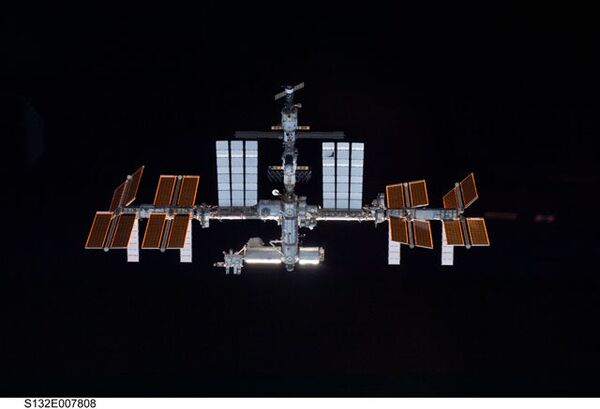On July 26, 2000 the Russian-made Zvezda module docked with the U.S.-made Unity and the Russian-made Zarya modules, creating the International Space Station. A few days later, Zvezda's computers took control of the station to ensure that it stays in its correct orbit. The first mission to the station was launched in November 2000.
The ISS, the successor to the Soviet Mir station, has been operational for ten years. It consists of several research modules, created by NASA, the European Space Agency (ESA) and the Japan Aerospace Exploration Agency (JAXA), which are connected by infrastructure modules deployed by the Russian Space Agency (Roscosmos).
Nearly $150 billion has been invested in the project to date, and there has been skepticism about the merit of the ISS's expensive research programs in the Western media from the start.
The Russian space community has other concerns regarding the ISS, first among them being that Roscosmos is used as a freight transportation company for the Western space agencies and that the Russian modules, including Zvezda, serve as warehouses and infrastructure elements.
There are other problems, and although they are technically smaller, they do significant damage to Russia's self-esteem. For example, the Zarya module was built and launched with NASA's money and is still formally and legally owned by the United States.
The U.S. Constellation Program (CxP) to send astronauts back to the Moon and possibly to Mars as well suffered a major setback in early 2010, when President Obama decided to exclude Constellation from the 2011 U.S. federal budget, stating that the program is "over budget, behind schedule, and lacking in innovation."
Immediately afterward, the lifespan of the U.S. segment of the ISS - and consequently the ISS - was extended from 2015 to 2020.
It is difficult to say if this is good or bad news for the Russian space program. Current plans call for the Russian segment of the ISS to be renovated by 2015-2016 and a Russian research module to be added in 2012. A new service module is to be sent up to replace Zvezda, which provides some of the station's life support systems, as well as living quarters for two crew members.
If the decision is made to decommission the ISS, these plans could result in the undocking of the Russian segment from the other modules and the formation of a solely Russian space station.
But the planned extension of the ISS's lifespan could keep Russia in its role as energy supplier for the ISS, leaving NASA, the ESA and JAXA in the leading role in space research. This would deprive Russia of the incentive to create its own orbital station to carry out Russian research programs.
Russia's main problem regarding the ISS is not the alleged inability of Roscosmos to deploy new basic modules, which the Russian Space Agency will most likely do, albeit with a minor delay. Rather, the problem is the lack of Russian orders for orbital research and related programs.
The research equipment of the Russian segment of the ISS (Russia is to have its own research module in two years at the earliest) is being used to fulfill other countries' contracts. What would a Russian space station do if there are no Russian research contracts? Would it be worth the cost to maintain an orbital station just to prove that we are a space power?
The Russian space exploration industry needs a comprehensive development program, including manned and unmanned space missions, orbital and interplanetary flights, research, space-based production and construction, and all types of launching craft.
The ISS could be a significant if not key element of that program.
(Konstantin Bogdanov for RIA Novosti)
The opinions expressed in this article are the author's and do not necessarily represent those of RIA Novosti.

